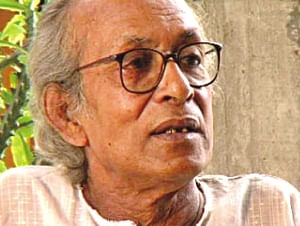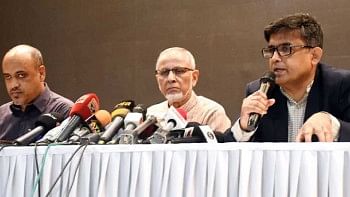Remembering Mahmudul Haque (1941-2008)

"One day everything becomes a story"…
Three years after Partition, a ten-year-old boy moved from Barasat near Calcutta to Dhaka, settling with his family in Azimpur. At West End High School, the teacher slapped him. "That was my shopnobhongo." His crime, he learned later, was that he had gone to school without a Jinnah cap. He also found the teacher hard to follow. To his ears, Dhaka rang with strange new dialects. Dialect could bewilder, though later he would learn that it could infuse richness in his own prose. In Mahmudul Haque's writing you will thrill to the voices of 24 Parganas, Bikrampur, and Dhakaiya.
If Pakistan meant such abuse, he wanted no part of it. The boy set off all by himself to reverse the journey that had brought them to Dhaka. Train to Narayanganj, steamer to Goalundo, train to Barasat. In time he came back. He admired the poet who lived next door, Mohammed Mahfuzullah. But the older man told him to stay away from a teacher who was a communist. The dictate only sparked curiosity.
One day he finally met Shahid Saber, who came to class as a substitute teacher. In prison Saber had done some translating, but the writing was scattered in multiple scraps of paper. The boy put the jigsaw puzzle together. From copying the other man's writing, he learned the syntax of writing prose.
In his teens, he started to publish stories.
I discovered the author late, through an interview by Ahmed Mostofa Kamal published in 2006. I was fascinated by both the man and author who surfaced in this conversation. I devoured his books. Each novel carried a unique voice. The lack of sentimentality in his 1971-based Jibon Amar Bone touched a chord. I was intrigued that his fiction often focused on passive, alienated men.
I began to translate his writing.
I also wanted to meet the man. When I phoned, he answered in a plain voice, "Come." After I showed up, he didn't let me leave for five hours. I only knew him for a year. Now with his passing on July 21, recalling his stories, I try to make sense of the man I got to know as a friend.
In the late 1950s while a student at Jagannath College, he heard that Mizanur Rahman was starting a magazine modelled after the Calcutta Ultorroth that had created a stir by including a novel in each issue. His first novel Draupudir Akashe Pakhi came out in Mizan's magazine, serialized in three parts, and then discontinued. By this time Mahmudul Haque had become friends with Mizan, but he couldn't work up the courage to ask him why he had dropped his novel. It was not until 1973, after his first book came out, that he finally learned the reason. The new book was praised in Bichitra by Mohammed Mahfuzullah, and Mizan confessed that he'd stopped the earlier novel because he'd been hectored by the very same man, "Why are you publishing him? Why are you trying to ruin him at so young an age?" Mizan had concluded that the novel wasn't good. Now he realized he'd misinterpreted.
Soon after he finished Jagannath College, he went to work, managing the new family business, Tasmen Jewellers at Baitul Mukarram. With his sharp eye, he would become an expert on stones. He now wrote his stories on the counter, standing up.
In 1967, he moved into a room in Shamibagh with Kajol, his new wife. They were 'undercover' from their families. It was Muharram time and he asked Kajol to visit her family during the mela. He sat down to write the novel Onur Patshala. He had been listening to boys playing marbles on a strip of earth along the house. An article on deja vu in The New Yorker had buzzed his brain. These elements entered the novel focusing on a middle-class boy caught between the unhappy marriage of his parents and the exciting world on the street, with boys at play and a mesmerizing girl named Sarudashi. He wrote the novel through the night. It would be the only novel he wrote in a single day, but he wrote most of his novels in one or two weeks. The only exception was Jibon Amar Bone that took three months.
Mahmudul Haque belonged to a generation of writers who gathered regularly in boisterous addas. One meeting spot was Beauty Boarding in Bangla Bazaar. The heart of these sessions became the poet Shahid Qaudri. With the city's growth, the addas shifted to the Gulistan area.
He recalled one night to me. A new issue of the police magazine Detective had just come out, carrying a story of his alongside poems by Shahid Qadri and Al Mahmud. At the Gulsitan restaurant, people discussed the poems but no one mentioned the story. Afterwards as they walked over to the cannon, he asked Shahid, "How come you didn't say anything about my story?"
Shahid replied, "Eto upoma keno?" Why so many similes? He then held out his arms and yanked them down. He shouted, "Langta kore dey! Langta kore dey!" Strip it naked!
Later Mahmudul Haque looked at his story and agreed.
On 25 March 1971, they lived on Road No 15 in Dhanmondi. When the curfew lifted for a few hours on the 27th, he rushed out like a madman, all the way to Sadarghat. He wanted to be a witness to the carnage.
Stuck in occupied Dhaka, life became hard. The store was looted. With a loan, he sold toiletries.
1971 would appear in his writing again and again. The first major creation was Jibon Amar Bone, a complex novel set entirely during that fateful March. The title was a tribute to Pasternak's poem 'Sister My Life'. When the novel first came out, some denounced it for the aloofness of its protagonist from the upsurge. Others were awed by the freshness of its language and its rejection of romanticism.
Until the mid-1970s, Mahmudul Haque set his fiction in the city. He began to crave a rural connection. With a friend as principal of Ichapura College, he embraced Bikrampur.
Whenever he could, he bolted there. His favourite time was the monsoons when the land flooded and people travelled from house to house by boat. The Bikrampur landscape emerged as a character in the works that came next, Kalo Borof, Matir Jahaj, and Khelaghar.
He heard of a village where everyone was massacred by neighbours during the war. The village had a reputation as a thieves' village. This impelled the story 'Buro Obader Joma Khoroch'. Mahmudul Haque was pained that no one felt that there had been anything wrong with the affair.
I think Bikrampur signified a deeper searching. A child of Partition, squeezed out of his birthplace, he remembered Barasat with both fondness and pain. I believe he was searching for a new sense of belonging.
He stopped writing around forty. People wanted to know why, but he wouldn't answer them. Once he admitted to me, "It's not like I intentionally stopped. That's just how it turned out."
Drafted into the group 'Padabali' that organized poetry sessions, he found the hypocrisy and pettiness alienating him from the literary world. And he became disgusted by the Bangali elite that year after year could see no further than its own bhog. It appears his searching led him to Narsingdi, to the man he called Baba. They drank and smoked together, and he believed the man held a deeper wisdom. To understand why he stopped writing I come back to what he repeatedly asserted, that creative output was linked to the energy of youth. It was a retrospective theory, but I do think in his case, his wizardry was connected to his younger self. Then he had unbounded curiosity, he embraced spontaneity, and he wrote in a single flow. His inspiration came from some place in his being where a piece of work would gel and then gush forth. After forty, in the midst of the slower person he was becoming -- a mirror of his own creations -- he lost access to that space. It is not that he did not try to write again. In the early 1990s he produced one story for the magazine Shoili. He said, "Writing it was agony."
Mahmudul Haque lost his wife in December. Something snapped inside. Like many couples bound tightly to one another, he too flew away within months.
But what a life! And what gifts he left us.
Mahmud Rahman is translating Mahmudul Haque's novel Kalo Borof.

 For all latest news, follow The Daily Star's Google News channel.
For all latest news, follow The Daily Star's Google News channel. 



Comments